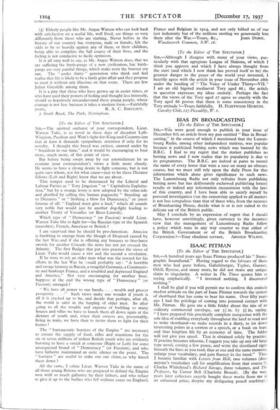ISAAC PITMAN [To the Editor of THE SPECTATOR.]
Sta,—A hundred years ago Isaac Pitman produced his " Steno- graphic Soundhand." Having regard to the labours of those men who had gone before, Gabelsberger, Taylor, Gurney, Odell, Byrone, and many more, he did not make any unique claim to singularity. A writer in The Times quotes him as saying emphatically. " I invented nothing. I discovered nothing."
I shall be glad if you will permit me to confirm this entirely modest attitude on the part of Isaac Pitman towards the system of shorthand that has come to bear his name. Over fifty years ago I had the privilege of coming into personal contact with Mr. Pitman. He gave me a little folder about the size of an ordinary commercial envelope, say 51 in. by 3J in, saying• " I have prepared this practically complete conspectus with thc sole idea of enabling everybody throughout the land to read and to write shorthand—to make records in a diary, to jot down interesting points in a sermon or a speech, or a book on loan, and thus lengthen life by an economy of time. The folder will not give you speed. That is obtained solely by practice. If practice becomes irksome, I suggest you take up any old large type novel, costing a few pence, and write the shorthand signs beneath the lines as you read, thus at one and the same moment, enlarge your vocabulary, and gain fluency in the hand." Thus I became familiar with Letters from Hell, two volumes (does anyone's vocabulary call for amplification from that source ?), Charles Whitehead's Richard Savage, three volumes, and Tht Professor, by Currer Bell (Charlotte Brontë). (By the way, years later collectors eagerly bought these works from me at an enhanced price, despite my disfiguring pencil markings.)
The genial old man, however, was vastly more disposed to talk about those other interests closer to his heart—reformed spelling (on which he seemed willing to expend his last shilling), a reformed diet, and a reformed spiritual faith that was the very fibre of his soul.
Would it not be a wonderful tribute to Isaac Pitman's memory on this hundredth anniversary of his first text-book if his proud hope were put into the way of fulfilment, and leave freely given to all educational authorities to re-issue the folder broadcast ; always granting that the Pitman system is superior to any modern competitor ? As to this last point I am in no way competent to express an opinion. We have the authority of Sir Lynden Macassey for the statement that Dr. John Robert Gregg's system is taught in no fewer than 95.6 per cent. of the American shorthand schools. This is an astonishing revelation of the progress of a system less than half the age of Pitmanism. Could not some entirely disinterested authority initiate such an inquiry, and establish a method freed for all time from all vexatious change ?
If the Isaac Pitman of my youth were alive today, I do not doubt (such was the high moral character of the man which fragrantly lives in my memory to this hour) that he would instantly discard his own rule once he was convinced that a better system (if that proved to be the case) was available, and one capable of serving the entirely worthy ends he held in view.
—Yours faithfully, W. RALPH HALL CAINE.
Ken Wood Farm House, N.W. 3.















































 Previous page
Previous page